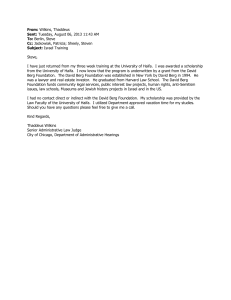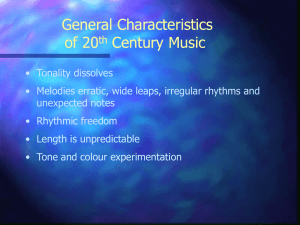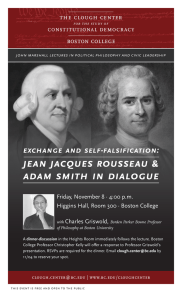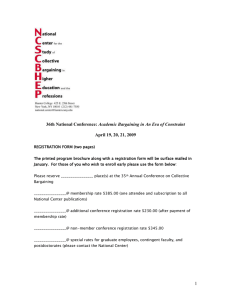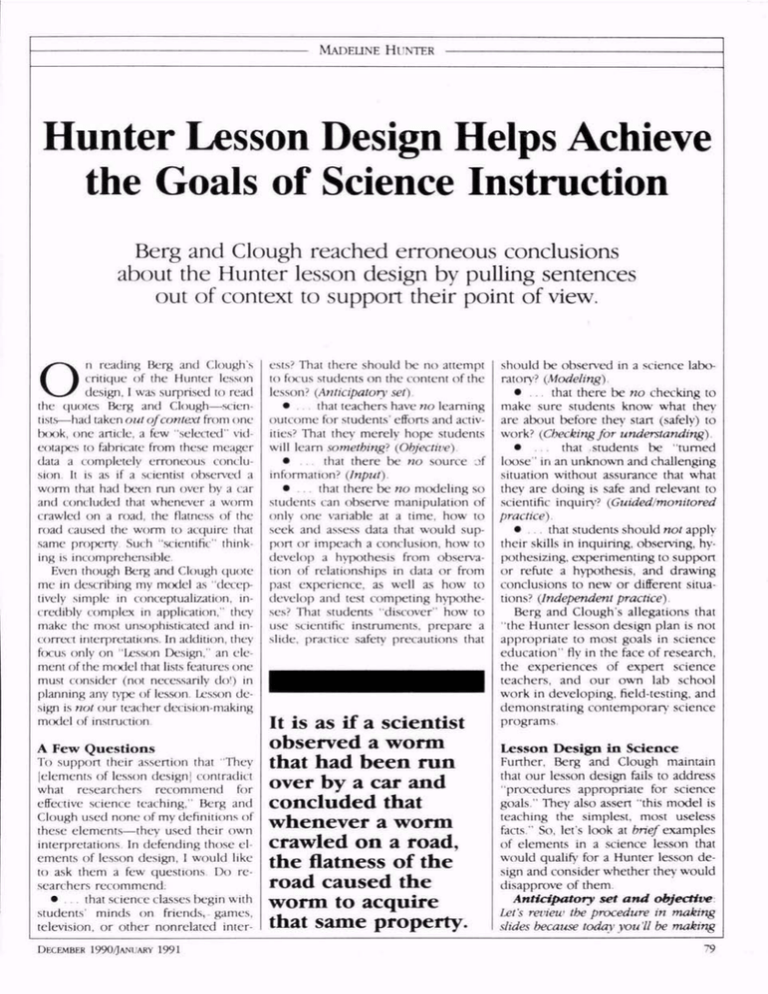
MADELINE HUNTER
Hunter Lesson Design Helps Achieve
the Goals of Science Instruction
Berg and Clough reached erroneous conclusions
about the Hunter lesson design by pulling sentences
out of context to support their point of view.
O
n reading Berg and dough's
critique of the Hunter lesson
design, I was surprised to read
the quotes Berg and Clough—scien
tists—had taken out of context from one
book, one article, a few "selected" vid
eotapes to fabricate from these meager
data a completely erroneous conclu
sion It is as if a scientist observed a
worm that had been run over by a car
and concluded that whenever a worm
crawled on a road, the flatness of the
road caused the worm to acquire that
same property Such "scientific" think
ing is incomprehensible.
Even though Berg and Clough quote
me in describing my model as "decep
tively simple in conceptualization, in
credibly complex in application," they
make the most unsophisticated and in
correct interpretations. In addition, they
focus only on "Lesson Design," an ele
ment of the model that lists features one
must consider (not necessarily do!) in
planning any type of lesson. Lesson de
sign is not our teacher decision-making
model of instruction
A Few Questions
To support their assertion that "They
[elements of lesson design) contradict
what researchers recommend for
effective science teaching," Berg and
Clough used none of my definitions of
these elements—they used their own
interpretations In defending those el
ements of lesson design, I would like
to ask them a few questions Do re
searchers recommend:
• ... that science classes begin with
students' minds on friends, games,
television, or other nonrelated inter
DECEMBER 1990/jANUARY 1991
ests? That there should be no attempt
to focus students on the content of the
lesson? (Anticipatory set)
•
that teachers have no learning
outcome for students' efforts and activ
ities? That they merely hope students
will learn something? (Objective)
• . that there be no source of
information? (Input).
• .. that there be no modeling so
students can observe manipulation of
only one variable at a time, how to
seek and assess data that would sup
port or impeach a conclusion, how to
develop a hypothesis from observa
tion of relationships in data or from
past experience, as well as how to
develop and test competing hypothe
ses? That students "discover" how to
use scientific instruments, prepare a
slide, practice safety precautions that
It is as if a scientist
observed a worm
that had been run
over by a car and
concluded that
•whenever a worm
crawled on a road,
the flatness of the
road caused the
worm to acquire
that same property.
should be observed in a science labo
ratory? (Modeling)
•
. that there be no checking to
make sure students know what they
are about before they start (safely) to
work? (Checking for understanding)
•
. that students be "turned
loose" in an unknown and challenging
situation without assurance that what
they are doing is safe and relevant to
scientific inquiry? (Guided/monitored
practice).
•
that students should not apply
their skills in inquiring, observing, hy
pothesizing, experimenting to support
or refute a hypothesis, and drawing
conclusions to new or different situa
tions? (Independent practice)
Berg and Clough's allegations that
'the Hunter lesson design plan is not
appropriate to most goals in science
education" fly in the face of research,
the experiences of expert science
teachers, and our own lab school
work in developing, field-testing, and
demonstrating contemporary science
programs
Lesson Design in Science
Further, Berg and Clough maintain
that our lesson design fails to address
"procedures appropriate for science
goals." They also assert "this model is
teaching the simplest, most useless
facts." So, let's look at brief examples
of elements in a science lesson that
would qualify for a Hunter lesson de
sign and consider whether they would
disapprove of them
Anticipatory set and objective
Let's review the procedure in making
slides because today you'll be making
79
your own slides to be used in develop
ing a hypothesis to explain ——— and
support your conclusions
This 'directive teaching" technique
focuses students on the challenge and
serves to verify or correct previous
learning that is essential to today's
science activities. It is much more than
"low-level recall of useless facts."
Berg and Clough completely misun
derstand the rationale, in reviewing
material, for calling on students who
will give an accurate answer. Do they
wish students' incorrect answers to be
made visible, with resultant humilia
tion plus possible pollution of other
students' understanding, or would
they prefer (as 1 would) that inaccu
rate memories be corrected with no
visibility and consequent loss of dig
nity? Berg and Clough apparently do
not realize that the example they cited
constituted a review of what already
had been learned, not discovery of
new learning.
Objective Today your group will
work with magnets to see how many
generalizations you can develop and
support Is this specifying "precisely
what they are supposed to learn" or
"robbing the lesson of inquiry" or
"eliminating curiosity"?
Input Remember what you've
learned about modifying only one
variable at a time, observing results
carefully, and checking whether or not
the data support your hypothesis. Your
information today will he derived
from your own observations while you
experiment with these materials. Is this
a "teacher-dominated lesson"? Input
can come from observation, experi
mentation, computers, films, or books,
not just from teachers.
Modeling Observe what I do, and
be ready to state whether my conclu
sions are valid or invalid, and why. Is
this blind imitation?
Checking for understanding
Look at your data to determine and be
ready to state which could he used
either to support or refute your hypoth
esis." Is this "low-level thinking"?
Guided/monitored practice I II
be circulating among your lab
groups Signal me if you have ques
tions or need assistance. Is this "rote
repetition"?
or:
Berg and Clough
had already drawn
their conclusions
before they
examined my work,
so they pulled
sentences and video
segments out of
context to support
their point of view.
Independent practice Identify a
question that you have about ———
Then design and conduct an experi
ment (by yourself/with your group)
that would answer your question. Is
this "low-level thinking"?
To a careful reader, these examples
demonstrate clearly how the ele
ments of instruction allow amply for
higher-level thinking, building on
student interests, and activating stu
dents prior knowledge.
Selective Extrapolation
Berg and Clough contend thai the
Hunter lesson design prescribes roles
of teacher and learner that not only do
not facilitate learning but that are in
consistent with many goals for science
education. Had they read carefully,
they would have found theory trans
lated into practice. Their claims that
"conspicuously missing in the model
are wait time, appropriate use of
praise, evaluation, diagnostic strate
gies" are not true.
Berg and Clough also conclude that
my model emphasized content acqui
sition at the expense of other student
goais Instead they could have quoted
my statements in Mastery Teaching,
All students have potential for creative
thinking. In many, that potential has been
scientifically extinguished by their 'major
ing' in recalling THE right answer rather
than using information as the launching
pad for more complex thinking.
Information and skills become useful
when they can be applied to a new, not
previously encountered situation. General
izations can be used to solve new prob
lems. Previous experience can be used to
predict outcomes, estimate answers, ex
trapolate from data, and/or avoid errors. It
is important that students have experience
in applying whatever they learn to new
problems or situations (Hunter 1982)
I reiterate this throughout the bcxjk.
Why couldn't Berg and Clough find it?
Interestingly, Berg and Clough
chide Mastery Teaching because "crit
ical problems and issues go unaddressed." They contend that "the
Hunter literature and videotapes don't
show us what delegating learning
decisions might look like in active
science inquiry." Why don't they "ad
dress" and "describe" them? Probably
because they realize that in a 15minute tape created to show theory
and practice, it is not possible to do
more than present psychological gen
eralizations and show vignettes from
many different disciplines so the
viewer may sense the ubiquity of those
generalizations in all content areas
The series was not produced to show
exemplary curriculums in science or
in any other discipline. A curriculum
specialist in language arts, dance, Ger
man, or philosophy could level the
same criticism.
Berg and Clough assert that " loo
many [of my| propositions .. are not
translated into procedures." Although
they quote from the introduction to
Mastery Teaching, they evidently over
looked the statement on the same
page, "In no way have we included all
the techniques which make teachers
more effective."
Had Berg and Clougl irefully ex
amined other chapters of that book or
even sampled my 12 other books and
over 300 journal articles, they might
have found innumerable translations
It is of "scientific" interest that they
present none of their "recommended
teaching strategies" to show how they
are in conflict with lesson design. The
truth is they aren't.
To support their arguments, Berg
and Clough quote old research data
incompletely reported by Slavin
(1989). In the Napa study they cite
EDUCATIONAL LEADERSHIP
(Hunter 1986), researchers reported
statistically significant academic gains
while using the Hunter model Gains
dropped when the teachers stopped.
They also cite Mandeville and Rivers'
article in Educational Leadership
(1988) as evidence against the Hunter
model, but those authors subse
quently stated that theirs was not a
valid Hunter model (1989) Although
Slavin (1989) reported West Orange
results after one year, the results after
four years show significant gains in
four of the six areas tested (Sousa and
Donnavon 1990) Scientists should
keep up with current findings
Here is an example of Berg and
Clough's selective extrapolation: they
quote pan of my Mastery Teaching state
ment, that
It is seldom that what we teach has no
reference to students' lives, hut frequently
they do not make the connection Conse
quently, in most (not all) cases you will
find it facilitating to tell students todays
objectives and the purposes or reason for
that learning S hould you wish either the
objective or its relevance to be discovered
or to be a surprise, that is fine (p 29)
Why don't they support this excerpt
with Berg's own revelation in the Na
tional Assessment of Educational Prog
ress (1978) that "only 22 percent of
young adults believe what they studied
in school science will be useful in the
future"? Instead, they pull out only the
middle sentence in an attempt to sup
port their contention that I believe that
students should be taught "precisely
what they will learn."
Out of the eight learning objectives
I listed, Berg and Clough selected,
"We're going to learn the classification
system of plants so you'll be able to
categorize each one correctly on the
final exam." They ignored objectives
such as "Today, we'll learn about cal
orie intake so you can regulate your
weight while eating foods you can
enjoy" or "After today, you'll be able to
determine when conclusions are valid
and when they're not That's a skill
you'll use throughout your life " Sci
entists shouldn t gcnerali?.e from one
instance
In the chapter, "Providing Informa
tion Effectively," I state,
DECEMBER 1990/jANLAsv 1991
A well-designed lecture can be adjusted to
learners' needs in terms of examples used,
pacing, vocabulary, and idea density. A
lecture also can be modified on the basis
of signals given during the lecture by
students, indicating their confusion, lack of
interest, or need for the relief afforded by
humor . Because so much teaching is
done by lecture, this chapter will focus on
that method of delivering information
Never have I "acknowledged that this
generic lesson model is more suited
to lecture," as Berg and Clough state.
This is another example of their prac
tice of using part of a sentence out of
context to draw a conclusion.
National School
Conference Institute
presents
THE FOURTH ANNUAL
NATIONAL
AT-RISK
STUDENT
CONFERENCE
A Most Unscientific Approach
Obviously, Berg and Clough had al
ready drawn their conclusions before
they examined my work, so they
pulled sentences and video segments
out of context to support their point of
view, ignoring any non-supporting
data This is a most unscientific ap
proach. One could create the same
effect by quoting selected excerpts
from the Bible, like: "Judas went forth
and hanged himself." to conclude that
"God said, 'Go thou and do like
wise.' "D
ctS\:v^HIGH
. CC@-'^STANDARDS
iV ^HIGH EXPECTATIONS
with EXIT OUTCOMES
|] PROBLEMS () STRATEGIES L^
VISION
MISSION
GOALS
References
Hunter. M (1986) "Comments on the
Napa. California, Follow Through Proj
ect " Elementary School Journal 87, 2.
Hunter. M. (1982). Mastery- Teaching. El
Segundo, Calif TIP Publications
Mandeville, G., and J. Rivers (1988) 'Ef
fects of South Carolina's Hunter-Based
PET Program." Educational LeMiership
46,4
Mandeville, G . and J. Rivers. (1989) "Is the
Hunter Model a Recipe for Supervi
sion?" Educational Leadership 46, 8
National Assessment of Educational Prog
ress (19^8) The Third Assessment of
Science. 1976-1977. Denver. Colo : Ed
ucational Commission of the States.
Slavin, R (1989). "PET and the Pendulum
Faddism in Education and How to Stop
It." Phi Delta Kappan ^0, 10
Soussa, D., and J Donnavon (1990) "FourYear Study of Hunter Model Show Stu
dent Achievement Gains in Some Areas."
The Developer 1 , 4, 6.
Madeline Hunter is Adjunct Professor,
University of California at Los Angeles,
1245 Casiano Rd.. Los Angeles, CA 90049.
fettiuiag
Jalme bcahurte
Henry Levin
Jerry Conntth
duries J*durd
Victor Herbert
CarlBoyd
Beginning and Advanced
"Hands-On" Training Sessions
On-Site School Visits
Special Bonus: Cooperative
Learning Training by
Edythe Johnson & Others
March 7-10, 1991
Phoenix, Arizona
For Conference brochure call
or write: NSCI, P.O. Box 941,
Rimroek. AZ 86335
(602) 567-550'
81
Copyright © 1990 by the Association for Supervision and Curriculum
Development. All rights reserved.

